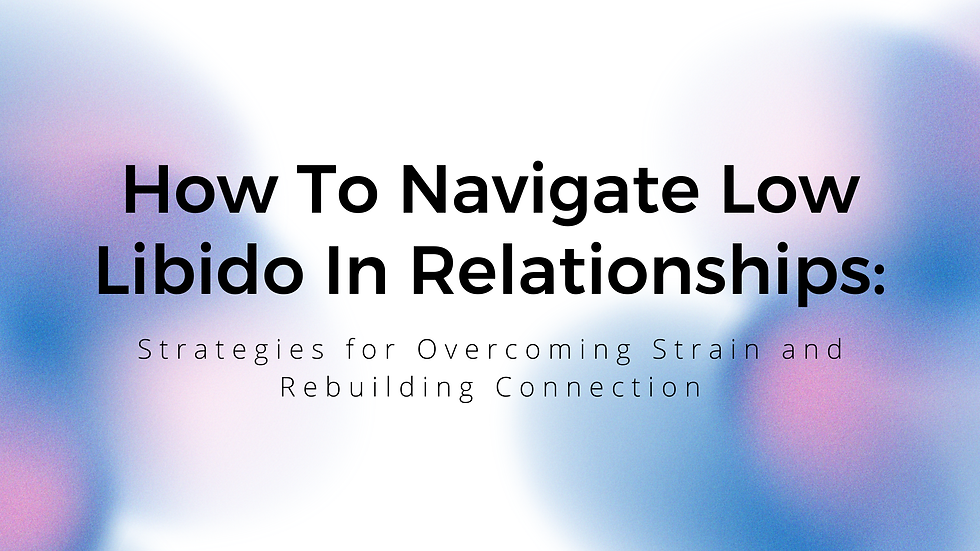Breaking the Cycle: Depression’s Impact on Sexual Desire—and How to Reclaim It
- Jan 14, 2025
- 3 min read
Updated: Sep 29, 2025
Feeling Stuck? You’re Not Alone. Let’s Talk About It.
Ever had a period in your life where you just didn’t feel like yourself—emotionally or physically? Depression can feel like a dark cloud that impacts everything from your energy levels to your self-worth. But one area that often gets overlooked in conversations about mental health? Your sexual desire. And if you’ve noticed a shift in your libido, you’re definitely not alone.
Let’s break the silence and explore how depression affects sexual desire, why this happens, and what you can do to reconnect with yourself and your partner
The Mind-Body Connection: Why Depression Impacts Libido
Depression isn’t just about feeling sad or down—it’s a complex mental health condition that can have a significant impact on your body, too. Here’s why your libido might take a hit when you’re experiencing depression:
Hormonal Imbalances: Depression affects the brain’s production of serotonin and dopamine—two neurotransmitters that play a big role in regulating mood and pleasure. When these levels dip, so does your interest in intimacy.
Energy and Fatigue: Depression can drain your energy, making even simple tasks feel overwhelming. Managing relationship burnout and navigating low libido can become crucial steps in maintaining intimacy during these periods. It’s no surprise that sexual intimacy might feel like too much to handle.
Self-Esteem and Body Image: Depression can make you hyper-critical of yourself, leading to feelings of inadequacy or discomfort with your body. It’s hard to feel sexy when you’re struggling to feel good about yourself.
Medications: Many antidepressants, especially SSRIs, list reduced libido as a common side effect. This creates a frustrating cycle: you’re treating your mental health, but your sex drive takes a backseat.
Breaking the Cycle: Practical Ways to Reclaim Desire
Good news: You’re not powerless against depression’s impact on your sexual wellness. Improving emotional intimacy and overcoming intimacy blocks are achievable goals, even during challenging times. Here are some steps you can take to reconnect with your desire and intimacy:
1. Communicate Openly with Your Partner
Let’s be real—talking about mental health and sex can feel awkward. But vulnerability is key. Let your partner know what you’re experiencing. It’s not about apologizing for your feelings but about creating understanding.
Tip: Use “I” statements to express how you feel. For example, “I’ve been feeling really low lately, and it’s affecting how I feel about intimacy. I want us to work through this together.”
2. Prioritize Emotional Connection
Sometimes, intimacy doesn’t start with physical touch—it starts with emotional connection. Focus on non-sexual ways to bond with your partner: cuddle, hold hands, or share a meaningful conversation.
Try This: Plan a “no-pressure date night” where intimacy isn’t the goal. Just focus on enjoying each other’s company.
3. Practice Self-Compassion
Depression often brings feelings of guilt and shame, especially when it affects your relationships. Remember: You’re not broken, and your worth isn’t tied to your libido.
Affirmation: “I am deserving of love and connection, no matter what I’m going through.”
4. Explore Mindfulness and Somatic Practices
Mindfulness techniques like deep breathing and meditation can help you reconnect with your body. Trauma release breathwork and mindful practices for couples are great ways to enhance this connection. Somatic practices, such as yoga or gentle movement, can also enhance your physical awareness and reduce tension.
Quick Tip: Try a five-minute mindfulness exercise before bed to help ground yourself and reduce anxiety.
When to Seek Help
If your low libido is causing distress or conflict in your relationship, consider seeking professional support. Exploring options like navigating mismatched libidos or trying sexual intimacy exercises for couples can help foster deeper understanding and connection.
Therapy and intimacy coaching can help you navigate the emotional toll of depression and rebuild your connection.
Check out our resource on How Intimacy Coaching Can Transform Your Relationship for more information.
You Deserve to Feel Good
Depression can make you feel isolated, but you’re not alone in this journey. Take small steps toward reconnecting with your body and your partner to create emotional safety—and remember, progress is progress, no matter how small.
Want more resources on emotional wellness and intimacy? Explore our free guides to support your journey toward a healthier, happier you.
And remember—healing is never linear, but it’s always worth it.
💛 At Zillennial Intimacy, we offer sex therapy and intimacy coaching to help individuals and couples rebuild trust, communication, and desire in a safe, affirming space. Click here to learn more or book a session. You don’t have to navigate this alone—support is here when you’re ready.
by Maddie Hundley (Sheffer), LMFT
@zillennial.intimacy




Comments